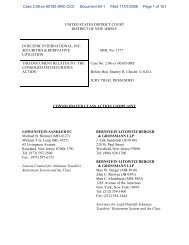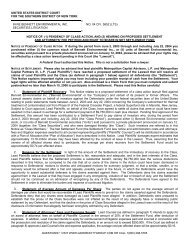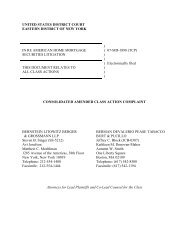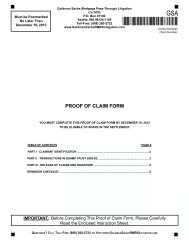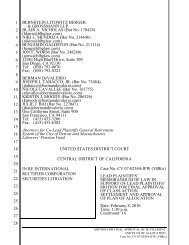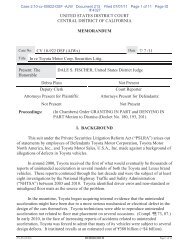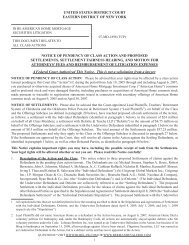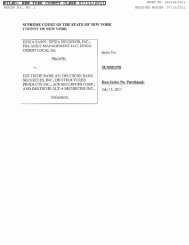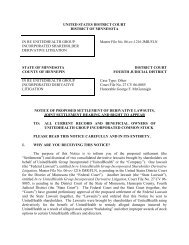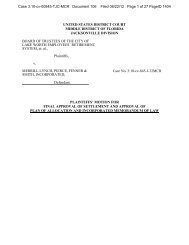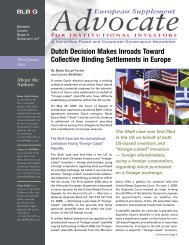to view the Lawdragon's - Bernstein Litowitz Berger & Grossmann LLP
to view the Lawdragon's - Bernstein Litowitz Berger & Grossmann LLP
to view the Lawdragon's - Bernstein Litowitz Berger & Grossmann LLP
Create successful ePaper yourself
Turn your PDF publications into a flip-book with our unique Google optimized e-Paper software.
<strong>to</strong> curtail rampant patent rights abuse.The push for patent monetization has continued unabated,however, and <strong>the</strong> business model has become so successfulthat even operating businesses with huge patent portfolioshave started dusting off <strong>the</strong>ir unused patents <strong>to</strong> generaterevenue streams and turning <strong>to</strong> <strong>the</strong>ir IP lawyers for help.One such company reportedly lured heavyweight patentlitiga<strong>to</strong>r John Desmarais <strong>to</strong> leave behind “a several-milliondollar partnership draw” <strong>to</strong> start a nonpracticing entityof his own, Round Rock Research. According <strong>to</strong> <strong>the</strong> WallStreet Journal, Desmarais was offered by his former clientMicron Technology <strong>the</strong> opportunity <strong>to</strong> buy 4,200 patents i<strong>to</strong>wns in <strong>the</strong> semiconduc<strong>to</strong>r space. Desmarais managed <strong>to</strong>raise enough capital <strong>to</strong> buy <strong>the</strong> patents and started his firm.The firm’s business model is straightforward enough, <strong>to</strong>strike licensing deals with companies that are infringing on<strong>the</strong> patents. If <strong>the</strong>y don’t pay, <strong>the</strong>y get sued. So far, his firmhas reportedly settled suits against some companies andhas sued companies such as Dell and Macy’s. (Desmaraisdeclined <strong>to</strong> speak <strong>to</strong> Lawdragon for this s<strong>to</strong>ry.)Mat<strong>the</strong>w Powers, ano<strong>the</strong>r superstar patent litiga<strong>to</strong>r, left1,200-lawyer firm Weil, Gotshal & Manges in 2011. Hestarted Tensegrity Law Group, which has recently filedsuits against Amazon and Sony and is planning <strong>to</strong> file morecases in <strong>the</strong> near future. His firm is also founded on <strong>the</strong>same premise: find valuable patents and go after infringers.The inven<strong>to</strong>ry of “really good” cases is enormous, he says.“I am just as<strong>to</strong>nished at <strong>the</strong> size of <strong>the</strong> potential marketfor something like this,” Powers said. “We vet <strong>the</strong>se casesvery carefully and we’re only going for very, very highquality matters.”Like any entrepreneur, <strong>the</strong> potential for huge profitsis what drew many of <strong>the</strong>se IP lawyers <strong>to</strong> leave <strong>the</strong>irmultimillion-dollar partnerships at big firms. But Powerssays it is also <strong>the</strong> opportunity for doing really interestingwork that finally made him decide <strong>to</strong> leave <strong>the</strong> big firmenvironment.“Most patent litigation at big firms has become morelike claims processing,” Powers noted. “The cases are notgoing <strong>to</strong> trial and <strong>the</strong>y are low-end work and mostly notinteresting. If you are on <strong>the</strong> plaintiffs’ side, you can chooseyour cases.”A New Business ModelJoseph Siino, founder of Berkeley-based IP consulting firmOvidian Group and a former big-firm patent litiga<strong>to</strong>r andsenior IP counsel at Yahoo!, says <strong>the</strong> exodus of talented IPprofessionals from large, general practice firms <strong>to</strong> moreentrepreneurial startup environments will continue in <strong>the</strong>coming years.“It’s a massive trend,” Siino said. “When IP lawyers seesome of <strong>the</strong> best of <strong>the</strong> best in <strong>the</strong>ir profession opting <strong>to</strong> moveoutside <strong>the</strong> traditional law firms, it will obviously impact<strong>the</strong> career planning of younger lawyers. Opportunities forIP lawyers outside of law firms are just growing and firmsdoing traditional IP work will have a hard time attractingand retaining <strong>the</strong> best IP lawyers.”Berten agrees. He believes more patent lawyers are going<strong>to</strong> go <strong>the</strong> entrepreneurial route if <strong>the</strong>y want <strong>to</strong> tap in<strong>to</strong> <strong>the</strong>IP monetization market.“A lot of <strong>the</strong> work we do is on a contingency basis, andfor general practice firms that is still a hurdle,” he said.Berten is speaking from experience. He had <strong>to</strong> leave <strong>the</strong>firm he founded, Competition Law Group, because hisfellow partners weren’t comfortable with contingency feearrangements.Berten wasn’t sold on <strong>the</strong> idea of contingency workuntil veteran Silicon Valley computer engineer and serialentrepreneur Larry Cooke called him in 2006. Cooke’scompany owned nine patents on a chip technology andwanted <strong>to</strong> sell or license <strong>the</strong>m <strong>to</strong> o<strong>the</strong>rs. His companycouldn’t afford <strong>to</strong> hire a lawyer so he tried <strong>to</strong> do it on hisown, but it didn’t work.“This is one marketplace where <strong>the</strong> cus<strong>to</strong>mer does notwant <strong>to</strong> see you,” Cooke said, laughing. “How can you be asalesman in that kind of marketplace?”He knew he needed a lawyer. But finding a qualified lawyerwho’d take his company as a client on a contingency basiswas <strong>to</strong>ugher than he realized. Cooke went through a seriesof lawyers. Some agreed <strong>to</strong> a contingency arrangement butdidn’t understand <strong>the</strong> technology. O<strong>the</strong>rs couldn’t do fullcontingency work.When Cooke finally connected with Berten, Bertensurprised him. Berten unders<strong>to</strong>od enough of <strong>the</strong> technology<strong>to</strong> know <strong>the</strong> market implications. Cooke <strong>to</strong>ld Berten tha<strong>the</strong> would get a percentage of <strong>the</strong> sale or license fees if hemanaged <strong>to</strong> find someone willing <strong>to</strong> buy or license <strong>the</strong>patents. If he failed, Cooke’s company would not pay.“It <strong>to</strong>ok a while <strong>to</strong> hammer out <strong>the</strong> fee arrangement,”Cooke said. “I spoke <strong>to</strong> him in early 2007 and he didn’t getback <strong>to</strong> me until later that year.”Berten finally <strong>to</strong>ok <strong>the</strong> case on pure contingency. Sixmonths later, he sold <strong>the</strong> patents for an undisclosed amountand his firm got a percentage of <strong>the</strong> sale.“Berten got a substantial share of <strong>the</strong> agreement,” Cookesays. “From our perspective it was reasonable becausehe managed <strong>to</strong> sell <strong>the</strong> whole lot for more than what weexpected <strong>to</strong> get.”Berten’s experience with Cooke convinced him that <strong>the</strong>IP market was ripe for <strong>the</strong> picking and that a law firm likeGlobal IP would be very much in demand. He was right,but so far Global IP appears <strong>to</strong> be one of just a handfulof firms that have tapped in<strong>to</strong> <strong>the</strong> patent monetizationmarket.“It wouldn’t surprise me if you see more patent lawyersgoing this route,” Berten said. “But <strong>the</strong>y’re not going <strong>to</strong> beat large general practice firms.” ■L A W D R A G O N 32 I s s u e 13



